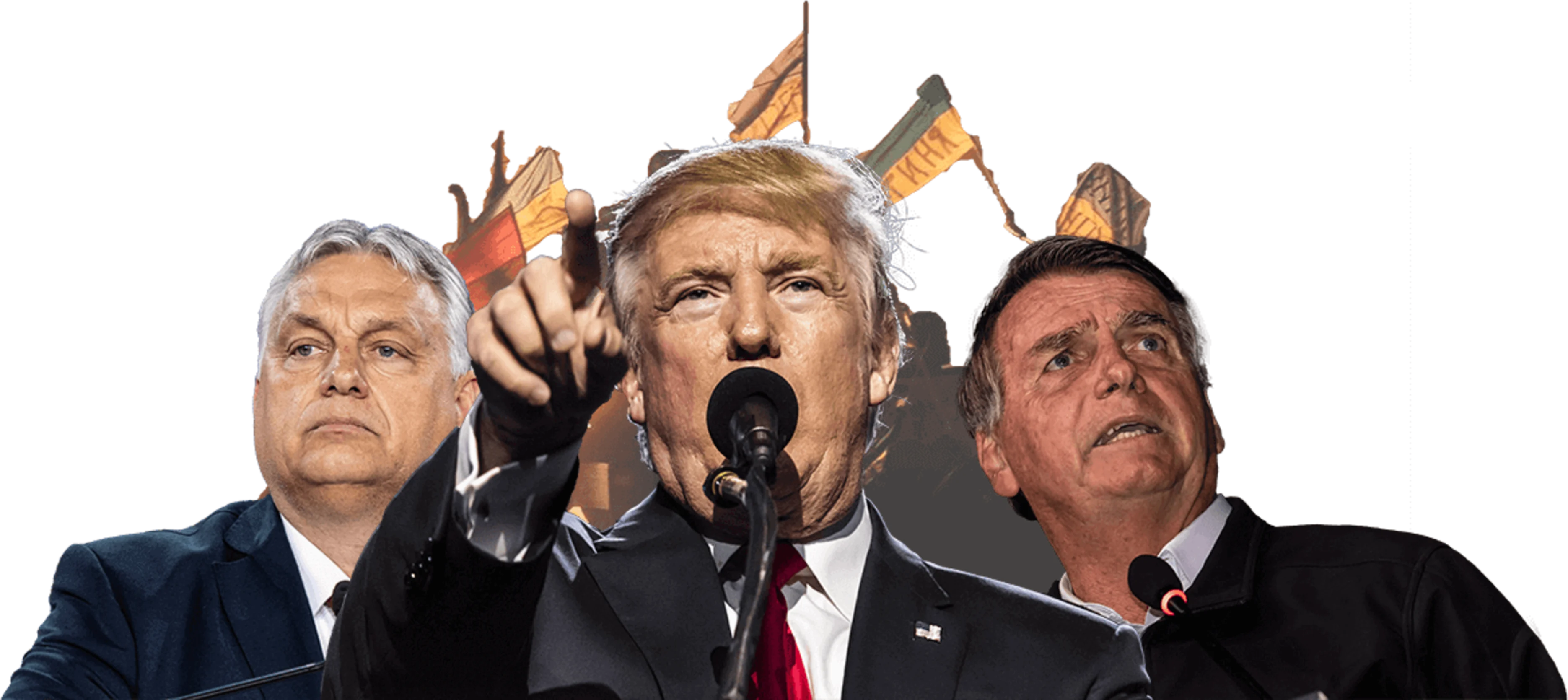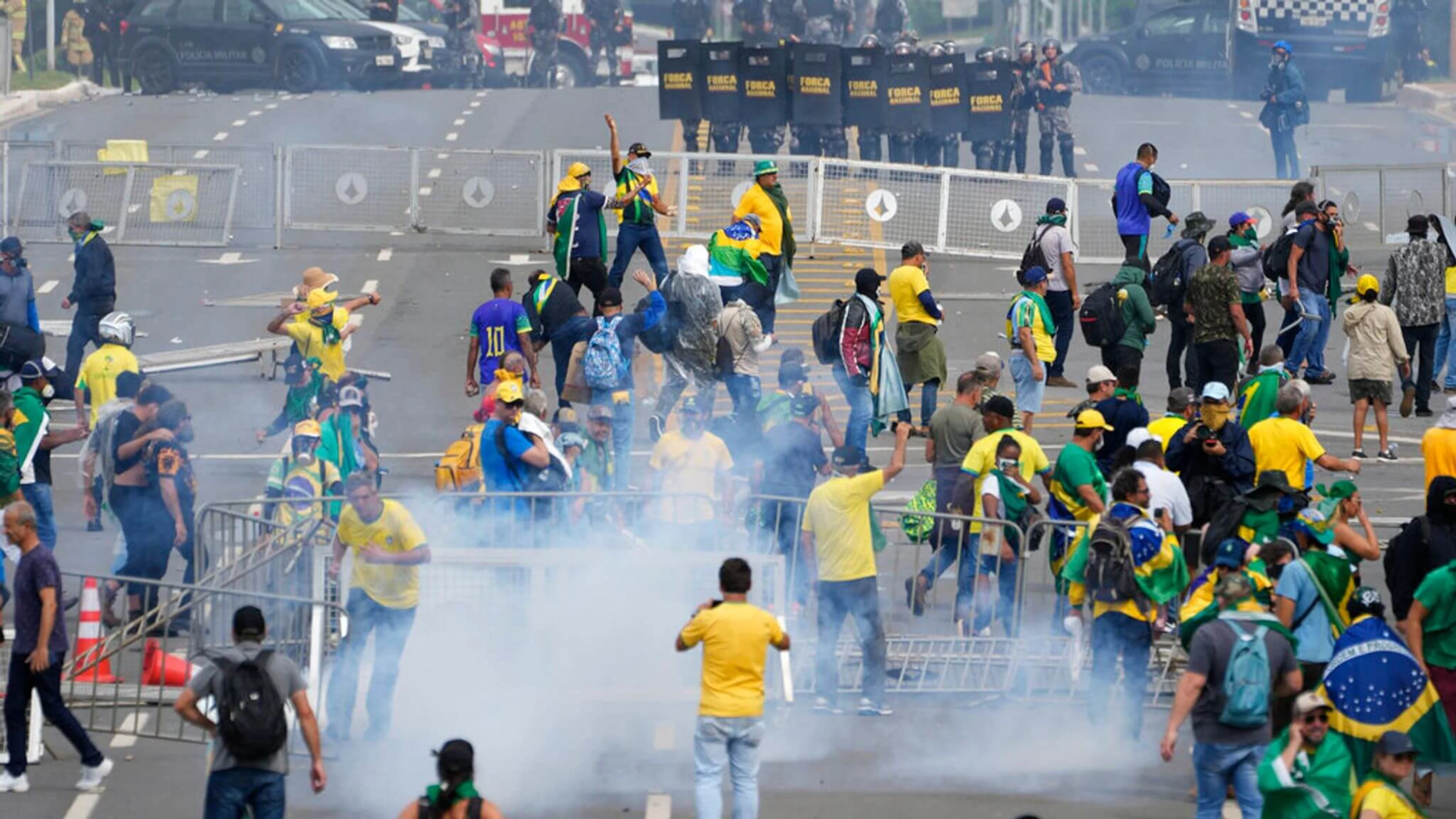Trump, Bolsonaro, and Beyond: Is this what democracy was meant to be?
By Taylor Green
16 March 2023
Brazil’s recent election represents a bump in the road for political democracy.

By Taylor Green
16 March 2023

Just two days after the anniversary of the US Capitol Hill riots, Brasilia was engulfed by raging fires and rising smoke in scenes of violent protest that resulted in over 1200 arrests. Bolsonaro, who lost to Luiz Inácio Lula da Silva (Lula) in Brazil's presidential election, had refused to accept the results. His fans, loyal servants of their leader, descended on the capital in his name in what was deemed the beginning of a coup. Once again, democracy was threatened.
A stampede was unleashed on the fragile soil of democracy, tearing it apart with great physicality only as its wounds had just begun to heal from the US Capitol riots.

Bolsonaro, the head of the riots, their puppetmaster, became intermingled with the same story as Trump, a story of frustrated supporters and a want for supreme power. Bolsonaro must have felt justified in this rioting reaction and the backing of a bloodthirsty crowd.
Bolsonaro justified his frustration by venomously citing that days after the election, he had felt a sense of injustice about how the electoral process took place. Let’s not forget that Trump, flailing his arms at the last string of hope, also proclaimed, “Biden has not been certified as the winner of any state” and that the outcome was “far from over”. Similarly to both their support groups, victory for their leader was all that mattered. The democratic process was worthless to them. It was trampled on as if stepping on an anthill.
The reason for the formation of these groups that have such great admiration for these leaders is instabilities. Instabilities lead to massive distress, and ultimately humanity in disarray looks for guidance like a small child: vulnerable and in need. Hope. That is really what these men desire to represent. Charismatic leaders such as Trump and Bolsonaro enchant the masses through policy changes and magical solutions following tragic events or periods of instability for the majority.
Instability is obviously a constant in Brazil. Social and economic unrest ultimately create inequality and instability between people, as is apparent in the wealth divide and social living standards of the poorest and richest in Brazil. And this instability ultimately leads to a gradual loss of political ideology and reactionary voting because of a loss of faith after years of traditional party politics, and the failure of this system to deal with great issues. A leader that comes along and says that they can fix things outside of the system and looks to critique it is a promising candidate for many struggling in the world. And the constantly shifting voting patterns represent this loss of faith in parties further.
Inequality and unrest are necessary to create support. However, the image of these leaders is also important for voters to identify with them, trust in them, and feel represented when they speak. Trump when he ran created the model for what a populist leader is. He presented himself as different from other politicians. Any chance he could he opposed the media, illegal immigration, and America’s past foreign policy. And this feeling of opposition was also something many who had lost faith in a political system that had failed the less fortunate felt and could therefore rally behind these ideas with Trump as their spokesperson.
Others have taken this model and attempted to mirror Trump's success to gain such power. Leaders such as Victor Orban, Benjamin Netanyahu, and Jair Bolsonaro all have the quality of leaders that stand in opposition to the so-called ‘establishment’.
As these leaders look to be abrasive, politics no longer seeks to make sense of the world; instead, politics is used to stir fear in the masses, to inject 'organic' radical positions into the extended arm of the populace, and to gain power.
This remarkable shift to radical politics now allows traditional destructive ideas to flow into the thoughts of individuals to where they attempt to undermine any system or political idea they disagree with. For example, the anti-immigration sentiment in Western reactionary politics could become standard practice. This would have catastrophic effects economically and socially, with an ageing West unable to cope and the public sector that requires extensive swathes of immigration. As Europe is on the decline with its future slow growth, it could become withered if this really happens.
Despite all these obvious attacks on democracy, there are still arms waving in support of it with equally significant counter-protests against the anti-democratic riots globally. However, despite this, the rise of authoritarian nations is still a considerable thorn in the side, sinking deeper into many democratic nations' wounds. The Freedom House Report has in fact assessed that authoritarian governments could increase in the future. Democracy is faltering. Also, at Davos last year, questioning the future of democracy was one of the panel's primary discussions. This is developing into a global issue. Therefore, the results are in! And the democratic structure is not being accepted or installed in as many nations globally as others had theorised it would.
Populism and these populist leaders can only be stopped by opposition parties creating general trust with voters and promising to handle issues that matter to them. Voters' fears come from a real place, and if this trust is gained in established democratic parties, there is a greater chance of slowing down the anti-democratic movement. Individuals will therefore have solid views of the world, rather than reactionary ones.
However, I am confident that liberal democracy can, with time to develop, rise out of the ashes and fallout of the reactionary politics of the 21st century and will clamber past the pile of failed regimes to claim its throne as the central global structure of government for centuries to come. It will ultimately outlive all such systems that have tried challenging it for this sought-after position. Despite its many glaring faults, it has a golden opportunity to allow the power of the people to thrive and become a driving force in representing the views of all people in politics far across all portions of the globe, speaking for and to all matters of people, for it is truly a universal political structure.
Written by
Taylor GreenPolitics and Sociology student looking to understand the functions of the world in all its systems and structures.
Read next
Why don't we vote? Let's address the elephant in the room

Sean Ryan
We need to end our obsession with American politics

Matt Jefford
Ignorance is not bliss. Take back your political ownership

Archie Rankin
Weekly emails
Get more from Taylor
The Fledger was born out of a deep-seated belief in the power of young voices. Get relevant views on topics you care about direct to your inbox each week.
Write at The Fledger
Disagree with Taylor?
Have an article in mind? The Fledger is open to voices from all backgrounds. Get in touch and give your words flight.
Write the Contrast